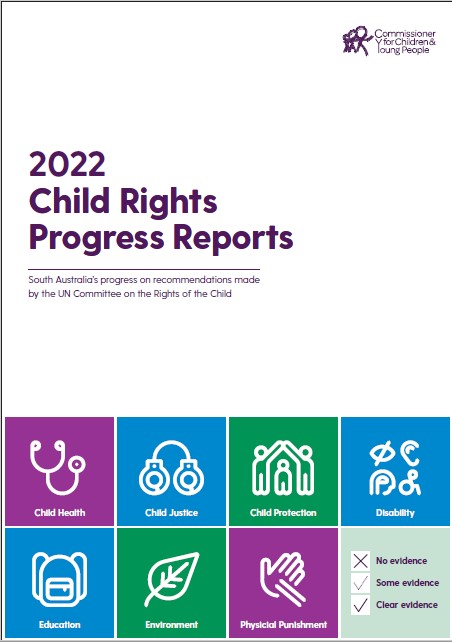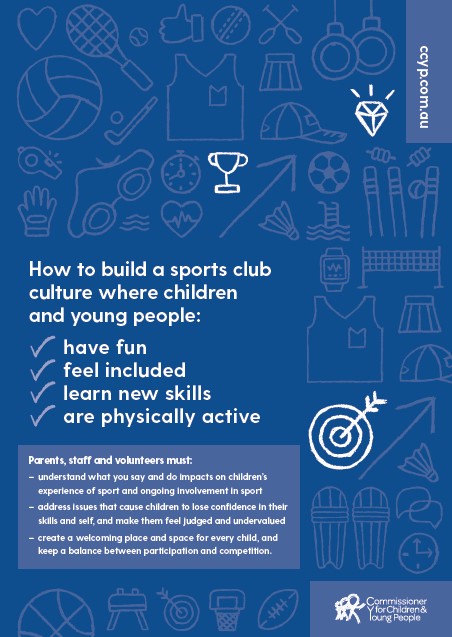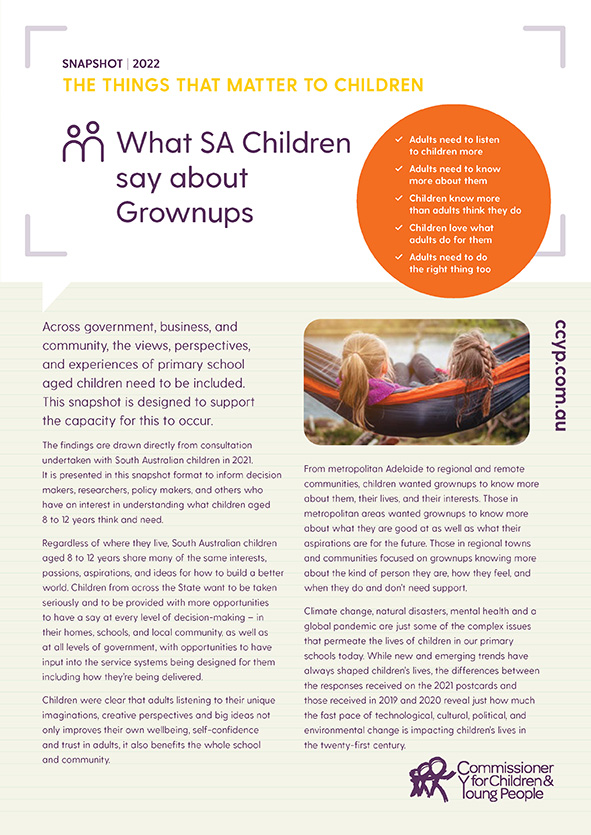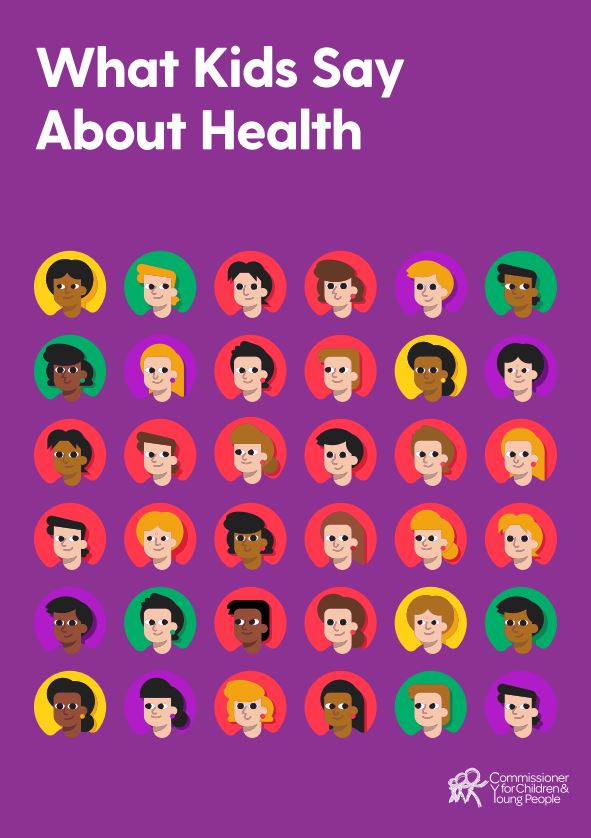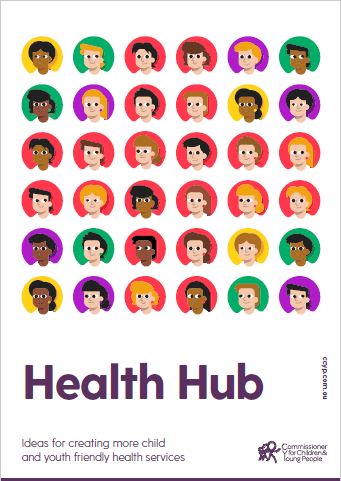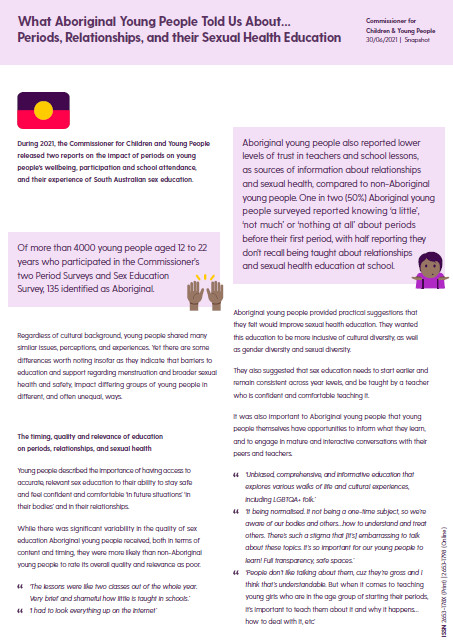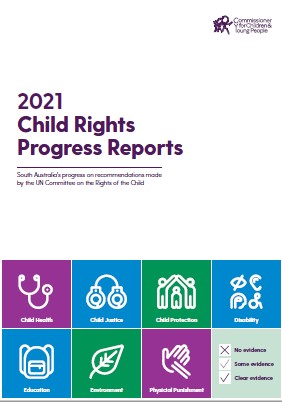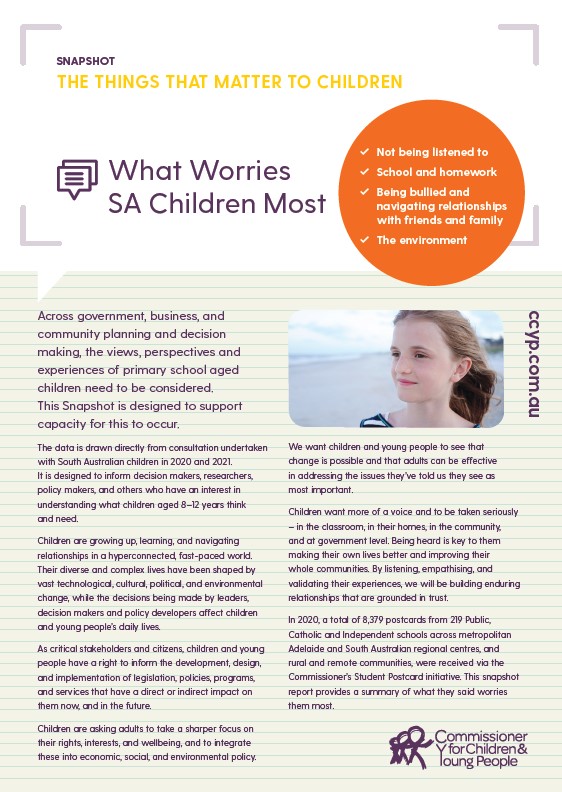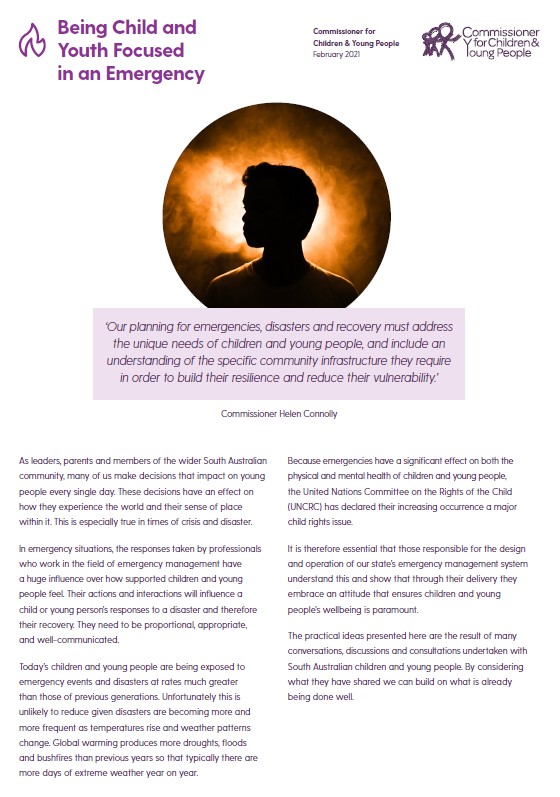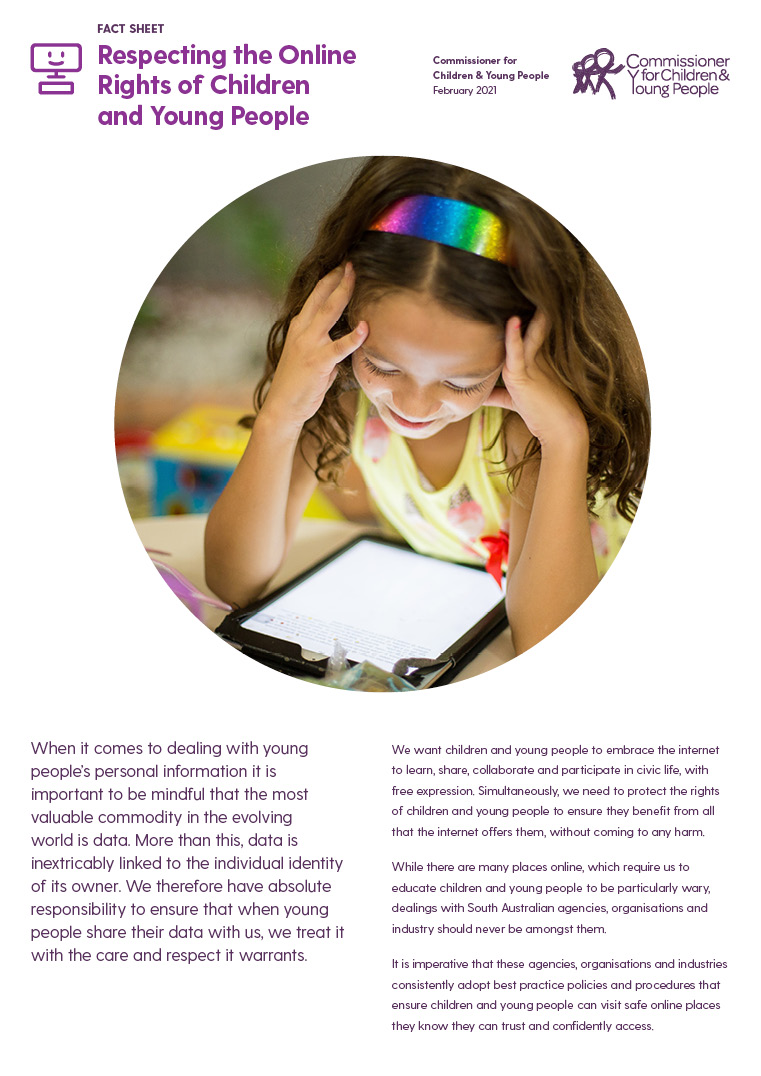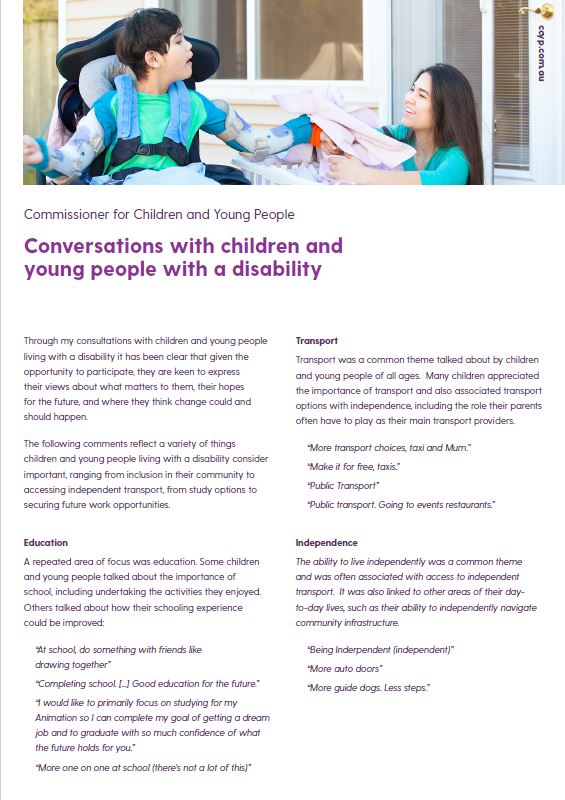Resources for Everyone
Below is a set of resources that cater to adults who deliver services to children and young people. This includes health professionals and emergency personnel, sports coarchs and medical professionals as well as policy makers, academics, decision makers and influencers. Feel free to download and share these resources amongst your networks and workplaces. You’ll find the complete set of CCYP resources including reports, submissions, fact sheets, snapshot reports, issues briefs and opinion pieces in the A-Z of Resources.
Child Rights Progress Reports 2022
Suite of Child Rights Progress Reports 2022 (8MB)
5MB – Adobe PDF
2022 Child Rights Progress Reports Summary
1MB – Adobe PDF
Becoming a Child Friendly Sports Club
Guide to Becoming a Child Friendly Sports Club
280KB – Adobe PDF
What SA Children Say About….
Through the Commissioner’s Student Voice Postcard initiative South Australian primary school aged children have consistently said that there are four things that matter to them more than most. Not surprisingly one of these is the environment. Another is school and homework. A third is needing assistance navigating relationships with family and friends and the fourth, not being listened to by adults.
Listening to the views, perspectives and experiences of primary school-aged children is relevant to all levels of government, but it also applies to local businesses and community organisations, as well as to schools and families. Not listening to what children tell us at this age means we risk alienating them at a time in their lives when they’re looking for reassurance that trusting the adults in their lives is worthwhile.
The following snapshots provide insights into what primary school aged children think about wellbeing, looking after the planet, covid, grownups, school, job skills and the future, and what worries them most.
The C Word
214KB – Adobe PDF
Grownups
313KB – Adobe PDF
Looking After the Planet
213KB – Adobe PDF
Wellbeing
328KB – Adobe PDF
What Kids Say About
Want to know what children and young people think about health, safety, wellbeing, education and citizenship? The following guides are the outcome of thousands of conversations the Commissioner has had with SA children and young people about what they think will make a difference to their lives. Download them as a reference tool, and to provide you with insights on how you can change your behaviours and environments to make children and young people feel valued, respected and listened to.
Citizenship
521KB – Adobe PDF
Education
439KB – Adobe PDF
Health
567KB – Adobe PDF
Safety
495KB – Adobe PDF
Wellbeing
646KB – Adobe PDF
Health Hub
Looking for a list of South Australian services and organisations that are specifically providing for the needs of children and young people? You’ve found it! Complete with index, you’ll find this guide a useful reference tool containing more than listings covering services and resources ranging from advocacy organisations to those working in the area of youth suicide prevention. Download your free copy today.
Health Hub is a comprehensive guide produced to support the crucial work undertaken by South Australia’s health professionals. It aims to offer ideas on ways to improve the delivery of health services and medical expertise to South Australian children and young people through sharing what they have told the Commissioner they want and need in relation to their health. Health Hub includes practical tips on how this knowledge can be applied in a medical setting to create a child and youth friendly environment.
Directory of Resources and Services for SA Children and Young People
931KB – Adobe PDF
For Medical Professionals
895KB – Adobe PDF
Periods, Relationships & Sexual Health Education
During 2021, the Commissioner for Children and Young People released two reports on the impact of periods on young people’s wellbeing, participation and school attendance, and their experience of South Australian sex education.
Regardless of cultural background, young people shared many similar issues, perceptions, and experiences. Yet there are some differences worth noting insofar as they indicate that barriers to education and support regarding menstruation and broader sexual health and safety, impact differing groups of young people in different, and often unequal, ways.
Read what differing groups of young people including Aboriginal, culturally diverse, LGBTQIA+ and young people living with disability have told us about periods, relationships and sexual health education.
What Aboriginal Young People Told Us
480KB – Adobe PDF
What Culturally Diverse Young People Told Us
356KB – Adobe PDF
What LGBTQIA+ Young People Told us
358KB – Adobe PDF
What Young People Living with Disability Told Us
339KB – Adobe PDF
Child Rights Progress Reports 2021
Every year the Commissioner prepares a series of Child Rights Progress Reports that examine South Australia’s progress on recommendations made by the UN Committee on the Rights of the Child in relation to child health, child justice, child protection, disability, education, the environment and physical punishment.
For Everyone
4MB – Adobe PDF
The Things that Matter to Children
Through the Commissioner’s Student Voice Postcard initiative South Australian primary school aged children have consistently said that there are four things that worry them most. Not surprisingly, one of these is the environment, another is school and homework, a third is needing assistance navigating relationships with family and friends, and the fourth is not being listened to by adults.
Listening to the views, perspectives and experiences of primary school-aged children is relevant to all levels of government, but it also applies to local businesses and community organisations, as well as to schools and families. Not listening to what children tell us at this age means we risk alienating them at a time in their lives when they’re looking for reassurance that trusting the adults in their lives is worthwhile.
The following snapshots provide insights into what primary school aged children think about school, job skills and the future, and what worries them most.
What SA Children say about School
964KB – Adobe PDF
What SA Children say about Job Skills and The Future
895KB – Adobe PDF
What Worries Children Most
915KB – Adobe PDF
What SA Kids Have Told Us About…
Since 2017, SA Commissioner for Children and Young People, Helen Connolly has spoken with thousands of South Australian kids to find out what they think are the most important issues of our time. The following fact sheets present their views and ideas in relation to a range of topics including Climate Change, Homelessness, Civics & Leadership, Learning, Play, Diversity and Inclusion, Environment, and Work with additional topics in the series being added over time.
Designed to inform leaders, decision-makers, researchers, policymakers, educators and parents and guardians, the resources offer insight into what matters most to young South Australians. They make clear what young people believe our priorities should be, highlighting what they would like adults to focus on fixing now for the benefit of future generations, as well as themselves.
View the accompanying short videos for each topic on the CCYP Youtube Channel
Climate Change
328KB – Adobe PDF
Play
Volunteering
324KB – Adobe PDF
Civics
Environment
Inclusion
Work
Wellbeing
339KB – Adobe PDF
Transport
Regional Kids
Health
Learning
Homelessness
280KB – Adobe PDF
Being Child and Youth Focused in an Emergency
Our planning for emergencies, disasters and recovery, must address the unique needs of children and young people across our metropolitan and regional communities. It must also include an understanding of the specific community infrastructure they require to build their resilience and reduce their vulnerability during and following an emergency or disaster.
Adults who are responsible for emergency management must commit to the view that children and young people are critical stakeholders. This means in practice they must ensure their operations reflect this view. This guide provides some practical ideas for ways in which this can be achieved. Some of the ideas have come from children and young people themselves. They include ideas on ways their competencies can be best utilised during an emergency as will as enabling them to contribute ideas and actions to the recovery process. This will also ensure that their interests, ideas and expectations can be considered and factored in while their emerging capacity for leadership is simultaneously nurtured.
Knowing Child Rights
Human rights are for everyone, young and old, no matter where you come from or live, what you like or believe. Human rights are about dignity, equality, and respect for everyone. Human rights cannot be taken away from you!
The world’s children have had their human rights documented in an international agreement called the ‘United Nations Convention on the Rights of the Child’ (UNCRC).
The UNCRC was introduced in 1989 and has been ratified by more countries in the world than any other international agreement, including Australia who became a signatory in 1990. Becoming a signatory means we commit to upholding these child rights and to working to ensure they are protected under national, state and territory laws. You can find out about all the rights encompassed in the UNCRC here.
Some of the key rights children need to know include the following:
- The Right to Freedom of Expression
- The Right to Education
- The Right to Good Health
- The Right to Play
- The Right to Protection
Access the series of Knowing Your Rights Fact Sheets below teaches children what their rights are and what they can do to make sure these rights are recognised and protected.
Respecting the Online Rights of Children
and Young People
We want children and young people to embrace the internet to learn, share, collaborate and participate in civic life with free expression. We also need to ensure that when they do so they are kept safe. When it comes to dealing with young people’s personal information it is important to be mindful that the most valuable commodity in the evolving world of technology and digital information is data. More than this, data is inextricably linked to the individual identity of its owner. We therefore have absolute responsibility to ensure that when young people share their data with us, we treat it with the care and respect it warrants.
This series of fact sheets provides some practical tips for organisations and parents on how to ensure data collection practices and policies protect children and young people’s privacy, including how to be mindful of the long-term repercussions of a child or young person’s digital footprint.
For Everyone
Being Healthy Guide
Young people in South Australia want health systems and services to implement plans and strategies that promote inclusion, diversity, kindness and trust. They also want to be engaged directly, and be treated with mutual respect and understanding. They want opportunities to be community leaders themselves and to have a positive impact on the lives of others.
For Everyone
How to be more child friendly and child safe
The Commissioner asked children what they thought would make the places they go to more child friendly and child safe. They came up with ten easy to understand suggestions for adults whether they’re parents, guardians, educators, service providers or community volunteers. Their ideas have been captured on this handy fact sheet poster, which can be downloaded for display in your child-care centre, classroom, service centre or community venue or other place that children and young people go. This poster complements the content that is published in the Trust is a Must report outlining the importance of cultivating trust between children and adults to ensure services are delivering what children say they need and not what adults think they need.
For Everyone
Conversations with children and young people living with disability
It’s clear that given the opportunity, children and young people living with a disability are keen to express their views about what matters to them most. They also wish to express their hopes for the future and where they think change could happen. This collection of comments made by children and young people living with a disability in conversations they have had with the Commissioner includes their views on subjects ranging from community inclusion to accessing independent transport, from having study options to securing future work opportunities.
For Everyone
Bullying Prevention
Children and young people have lots of ideas on how to prevent bullying. They would like to get involved in anti-bullying programs and learn skills to build friendships. This collection of fact sheets contains information that children and young people want their parents, teachers and coaches to know about how they believe bullying can be prevented, as well as ways in which they think anti-bullying strategies would be best implemented at home, school, sport and other recreational environments.
For Everyone
For Sports Clubs
Reducing the voting age
Some people complain about political campaigns and having to line up at the ballot box to cast their vote in what can feel like an endless cycle of federal and state elections. Yet, for some young Australians, voting is a privilege that remains out of their reach. Around the world, the desire to provide young people with an opportunity to vote is gaining momentum.
For Everyone
385KB – Adobe PDF

